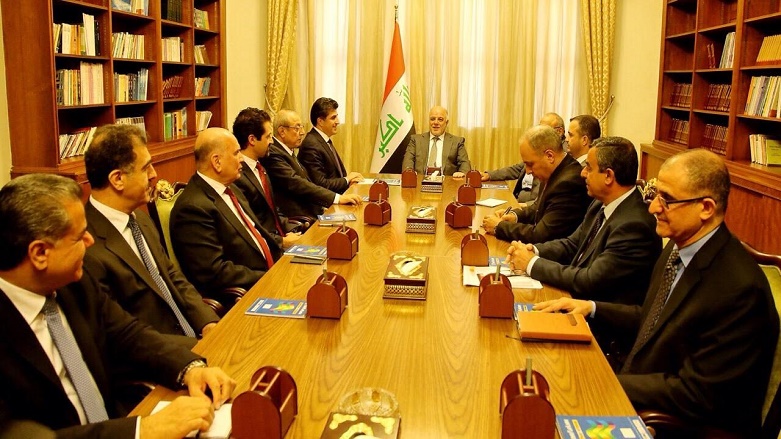KRG, Baghdad emphasize negotiation and dialogue

ERBIL, Kurdistan Region (K24) – Erbil and Baghdad agreed to resolve issues through peaceful negotiations, following their meetings on Sunday.
The Kurdistan Regional Government (KRG) delegation headed by Prime Minister Nechirvan Barzani visited Baghdad to meet with many officials including Prime Minister of Iraq Haider al-Abadi, President Fuad Masum, former prime minister Nouri al-Maliki, and leader of the Islamic Supreme Council of Iraq (ISCI) Ammar al-Hakim. The delegation also met with British Ambassador to Iraq Frank Baker and US Ambassador Stuart Jones.
In the meetings, many topics were discussed: the Islamic State (IS) war, the oil issue, the budget share of the KRG, the current financial crisis, political instability in the country, and the affair of refugees and Internally Displaced Persons (IDPs) in the Kurdistan Region.
Both sides emphasized the importance of addressing problems between Erbil and Baghdad through peaceful means and negotiations. They agreed that the KRG and Iraqi Federal Government should cooperate in fighting against IS.
In addition, Baker and Jones hoped that the meetings would result in further negotiations for resolving the bilateral issues between Erbil and Baghdad. The KRG delegation asked both ambassadors to provide more military and humanitarian aid as it has a stretched border with IS, and encompasses over 1.8 million refugees and IDPs.
Furthermore, Saad al-Hadithi, a spokesman for Iraqi PM Abadi, told K24 on Sunday that the visit of the KRG delegation to Baghdad was vital because the bilateral relations were previously under tension.
“The meetings will continue until both sides reach a joint agreement regarding security, oil, and administration reforms which are very important subjects,” Hadithi said. “In the meetings, Erbil and Baghdad discussed the military cooperation between Peshmerga and Iraqi forces in liberating Mosul from Da’esh [IS].”
He noted that the KRG was not committed to the previous oil agreement with the Iraqi Federal Government. Hadithi stated that Kurdistan was required to export 550,000 barrels of crude oil per day through Baghdad’s oil marketing SOMO Co. However, the KRG distributed half of it in the first six months of 2015 before doing so independently for the remainder of the year.
“If the KRG exports the amount of oil asked by the Iraqi Federal Government (550K), Baghdad will send their budget share,” Hadithi added.
Regarding Peshmerga, the spokesman mentioned that the forces are part of the Iraqi defense system. “Since Peshmerga are part of Iraq's defense system, they cannot be armed directly by foreign countries. Peshmerga should receive weapons only through Baghdad. The vice-versa is a violation of Iraqi sovereignty,” he stated.
Hadithi also commented on the Kurdish referendum, stating that the KRG and Iraqi Federal Government should abide by the constitution of Iraq regardless of their issues.
Moreover, Kurdish politician and former Iraqi Migration and Displacement Minister Dindar Najman Doski believes that negotiations are important, but he is not optimistic about the KRG receiving any financial help from Baghdad.
“Baghdad is struggling from a financial crisis too. I am less hopeful about their financial support to the Kurdistan Region,” Doski told K24.
Reporting by Mewan Dolamari
Editing by Karzan Sulaivany
